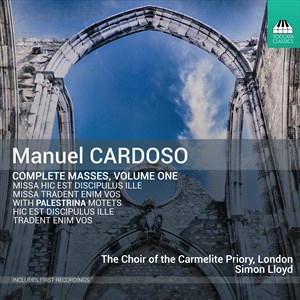
ESSENTIAL RECORDINGS

Giovanni Palestrina: Hic est discipulus ille Manuel Cardoso: Missa Hic est discipulus ille Giovanni Palestrina: Tradent enim vos Manuel Cardoso: Missa Tradent enim vos
It's 1625 ... you step inside a dark, candlelit gothic chapel and are stunned as you hear the choir of a cappella voices intone the opening lines of the Kyrie from the Missa Hic est discipulus ille by Portuguese composer Manuel Cardoso (1566-1650). You are literally awestruck where you stand, and filled with wonder at the undescribable beauty of the sound you hear emanating from the loft. Fast forward 400 years. It's 2022 ... you step inside (if it's not locked) a brightly lit, white-plastered local church and all you hear is the low hum of air conditioners and the buzz of the flickering fluorescent lights up above. Gone are most of the daily music-filled rituals that used to draw people in if only for a moment of contemplation and respite from the outside world. How, or rather why, did humanity allow itself to descend to such a low level of musical relevance?
Thankfully we still have musicians of high calibre like the Choir of the Carmelite Priory, London to carry the torch forward. As the booklet notes point out: "The choir played an important role in the restoration of polyphony to common liturgical use in Great Britain. It recorded Masses by Palestrina and Victoria, released on Decca in 1951 and re-released several times since. In recent years, the choir has become known for its innovative project-based music programming, including the monumental 'Cardoso450' in 2016-17, marking the 450th anniversary of the birth of the Carmelite composer Frei Manuel Cardoso, of which this recording is a lasting legacy." As well, organist and music director Simon Lloyd "considers himself fortunate to work with wonderful consort singers and perform in what he holds to be one of the best acoustics in London."
These two mass settings by Cardoso are often referred to as "parody masses" because they use motets by Palestrina as their foundation. But the polyphonic edifice built upon this foundation is pure Cardoso. This was at a time when tonality was in flux and serendipitous discoveries occured on a regular basis. Cardoso's use of accidentals and unusual intervals elevated the harmonic fabric of the music to levels unheard of before. Along with Tallis, Byrd, Gibbons, Desprez, Lassus, Morales, etc... the music of Manuel Cardoso still stands today as one of the highest achievements in human endeavour.
Jean-Yves Duperron - January 2022